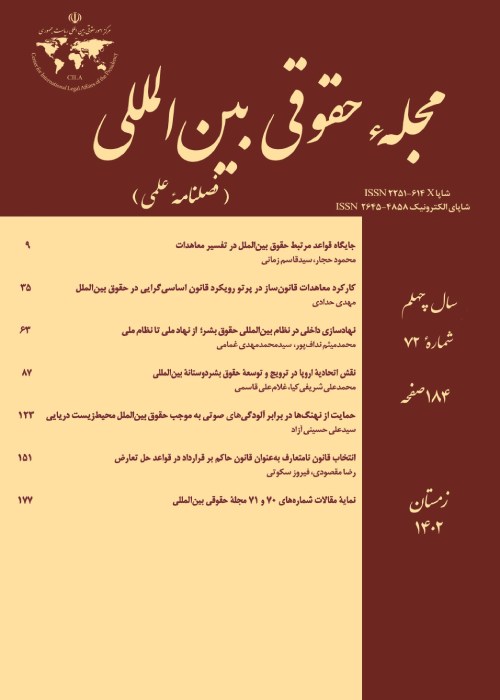Legal Consequences of War on Territory From Islamic & International Law Views
Author(s):
Abstract:
“State of War” is the most significant consequence of war declaration. “Dār AL- Harb” is considered as the land against which Islam has declared the state of war. Sometimes it may be as the same as “Ma’rekeh” (the theater of war). Declaration and beginning of war influences the entire world and especially puts effects on political and commercial relations which may lead to their suspension, revocation or rejection. In international law, the theater of war is different from the region of war. The theater of war is the region in which the military combat takes place. The totalitarian nature of the modern war leaves no way-out for the impartial or neutral lands. Here, the discussion is over the restriction of region or theater of war. Three issues have been proposed for such a subtle: 1) Determination of military goals 2) Establishment of non-military zones 3) Preservation of cultural relics. Through the distinguishment of Dār AL-Harb from Ma’rekeh and restriction of military regions, Islam rejects the manslaughter of civilians and “Da’vat” (invitation) is the very fundamental basis of Islamic wars. Prohibition of military tactics against women, children and civilians has been quoted in different Islamic and historically documented texts from the early days of Islam. Theater of war has its own legal status and rights in Islam: 1) Right to seize the prisoner of war 2) Right to take booty of war 3) Right to take the enemy’s soldiers’ clothes or personal effects. The second issue is equal to Fructus doctrine (right of enjoyment) in international law. In Islam, booty of war is considered as public property and it is also noted that the warrior “Mojahid” of Islam is religiously free to take possession of enemy’s clothes and private stuff under the permission of Imam, in contrast with the modern international law which is silent regarding such issues. Another difference between Islamic views and international law is the status of murdered. The murdered is called “Shahid” (martyr) in Islam. It is noteworthy to say that Islam categorizes the lands (Dārs) into Dār AL-Harb which is usually as the same as Dār AL-Kofr confronting Dār AL-Islām but the latter is not necessarily Dār AL-Harb. Dār AL- Hayād is the impartial land and has her own rights and there is no such a category in Qr’ānic verses. Another type of Dār is Dār AL-Movāda’eh «The Land of Convenient» which enters into a treaty of non-hostility with Dār AL-Islām and the Shiite confirms it. Dār AL-AHD is the land in which one of the divine religions of Christianity, Judaism or Zoroastrianism is her official religion and sometimes it is called Dār AL-Sulh. Dār AL-Hodneh has not the above- mentioned features but in case of war against her, Dār AL-Islām may loose her interests.
Language:
Persian
Published:
International Law Review, Volume:20 Issue: 28, 2003
Page:
265
magiran.com/p490604
دانلود و مطالعه متن این مقاله با یکی از روشهای زیر امکان پذیر است:
اشتراک شخصی
با عضویت و پرداخت آنلاین حق اشتراک یکساله به مبلغ 1,390,000ريال میتوانید 70 عنوان مطلب دانلود کنید!
اشتراک سازمانی
به کتابخانه دانشگاه یا محل کار خود پیشنهاد کنید تا اشتراک سازمانی این پایگاه را برای دسترسی نامحدود همه کاربران به متن مطالب تهیه نمایند!
توجه!
- حق عضویت دریافتی صرف حمایت از نشریات عضو و نگهداری، تکمیل و توسعه مگیران میشود.
- پرداخت حق اشتراک و دانلود مقالات اجازه بازنشر آن در سایر رسانههای چاپی و دیجیتال را به کاربر نمیدهد.
In order to view content subscription is required
Personal subscription
Subscribe magiran.com for 70 € euros via PayPal and download 70 articles during a year.
Organization subscription
Please contact us to subscribe your university or library for unlimited access!



